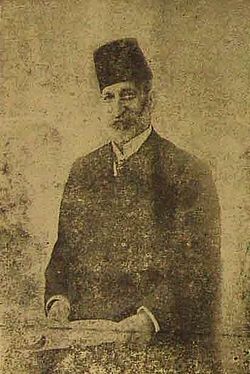Menahem Saleh Daniel
 From Wikipedia - Reading time: 3 min
From Wikipedia - Reading time: 3 min
Menahem Saleh Daniel | |
|---|---|
| مناحيم صالح دانيال | |
 Menahem Saleh Daniel | |
| Senate of Iraq | |
| In office 1925–1929 | |
| Monarch | Faisal I of Iraq |
| Constituency | Baghdad |
| Deputy for Baghdad to the Ottoman Chamber of Deputies | |
| In office 1877–1880 | |
| Monarch | Abdul Hamid II |
| Prime Minister | İbrahim Edhem Pasha Ahmed Hamdi Pasha Ahmed Vefik Pasha Mehmed Sadık Pasha |
| Personal details | |
| Born | Menahem Saleh Daniel 1 March 1846 Baghdad, Ottoman Iraq |
| Died | 3 November 1940 (aged 94) Baghdad, Kingdom of Iraq |
| Resting place | Ezekiel's Tomb, Baghdad |
| Citizenship | Iraq |
| Profession | Businessman, landowner, politician |
Menahem Saleh Daniel (1846-1940) was an Iraqi Jewish businessman, landowner, philanthropist and politician who served as a member of the Senate of Iraq and Deputy for Baghdad to the Ottoman Chamber of Deputies.
Biography
[edit]Menahem Saleh Daniel was born on 1 March 1846 in Baghdad, to Iraqi Jewish parents. He studied in the schools of Baghdad before moving to Europe to study science. He was elected on behalf of Baghdad as a representative in the Ottoman Chamber of Deputies in 1877. He became famous in commercial and economic circles and was known for his commercial relations with the country’s notables. Daniel was appointed as a member of the first board of directors of the Baghdad Brigade, which was founded by the governor, Medhat Pasha. After the establishment of the monarchy in Iraq, he became a member of the Senate of Iraq in 1925, representing the Mosaic Jewish community in Iraq.[1][2][3] His son Ezra Saleh Daniel (1874-1952) succeeded him on the Senate.[4]
His father Saleh Daniel, was famous for his charitable projects and had a palace located in Al-Sinak area. Menahem Daniel was known as "Man with the White Hand" as he founded and built the first orphanage for Muslim orphans and spent on it from his own money to help Muslim orphans and those from different sects.[5]
Philanthropy
[edit]Daniel made substantial donations to both Jewish and Muslim charities, and built a Muslim orphanage in 1928, and a Jewish primary school in 1910.
Personal life
[edit]His nephew was Sir Sassoon Eskell.
References
[edit]- ^ البغداديون أخبارهم ومجالسهم - تأليف إبراهيم عبد الغني الدروبي - مطبعة الرابطة - بغداد 1958م - مجلس مناحيم دانيال - صفحة 209.
- ^ Basri, Meer. "Prominent Iraqi Jews of recent times". dangoor. Retrieved 23 November 2015.
- ^ Greene, Annie. "What Do You Know? Iraq's Jewish History". Katz Center for Advanced Judaic Studies. Retrieved 28 April 2019.
- ^ T. Morad; D. Shasha (2008). Iraq's Last Jews: Stories of Daily Life, Upheaval, and Escape from Modern Babylon. Palgrave Macmillan US. p. 186. ISBN 978-0-230-61623-3.
- ^ "Wayback Machine". 2016-09-19. Archived from the original on 19 September 2016. Retrieved 2022-06-06.
 KSF
KSF